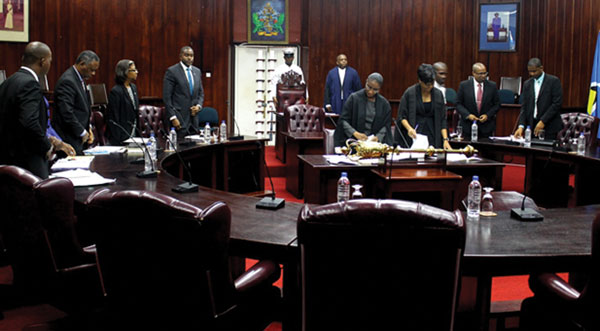TODAY, just after British MPs file into the House of Commons to hear Prime Minister Theresa May explain her controversial Plan B for Britain’s exit from the European Union (EU), Saint Lucia’s 17 MPs will be doing the same: to hear Prime Minister Allen Chastanet defend his government against an Opposition No Confidence Motion.
In Britain’s case, Mrs May will be seeking support of her parliamentary colleagues for her plan, which is opposed by most, even though most of her Conservative Party colleagues just late last year supported her in a narrow victory to survive a No Confidence Vote that exposed just how unpopular she’s become.
In the Saint Lucia case, however, Mr Chastanet will be facing a vote in which he has the numbers to win, but not necessarily the absolute certainty that political leaders will need today, if only according to by-elections involving margins considered too close for comfort.
Prime Minister Chastanet’s ruling United Workers Party (UWP) enjoys a five-seat (11-6) overall parliamentary majority in the House of Assembly. However, the Opposition only requires three votes to reverse the majority to a new 9-8 balance that would trigger the resignation of the Prime Minister.
Top ruling party figures are quietly confident the opposition’s motion will be defeated. One told The VOICE: “We have a united team and a united Cabinet and all are committed UWP members who stand by the party, with no reason to have to vote against the party’s leader and prime minister.”
According to this source, who did not want to be identified on account of her ‘location and vocation’, “Besides, we have been through half of our term and we are managing the country better than the last Labour lot.”
But not so on the opposition side, which can only get the motion passed if three government MPs support it.
According to one opposition activist campaigning for Labour supporters to turn up outside the parliament for today’s sitting, “Everybody knows there is better material in the leadership of the UWP than (Prime Minister Allen) Chastanet. Some have more experience than him and others also have reasons to support change from within.”
Asked how a change of Prime Minister will benefit the SLP, the activist told The VOICE: “We are not doing this for ourselves, but for the country. We don’t have the votes to move Chastanet off the backs of Saint Lucians, but we feel sure there are those on the UWP side in the parliament who will welcome a chance to take the first steps to help save our country.”
Prime Minister Chastanet hasn’t (up to press time) given any indication what the government’s response or defense will be.
His recent State of the Nation Address delivered on January 12 was a positive and optimistic assessment of his government’s achievements during its first two-and-a-half years, midway through the maximum five years of his administration’s term.
But the opposition has seized on both the New Year address and tourism statistics recently released by the government to flay its massive borrowing (over $700 million in 2018 alone) and question the direct economic impact of the increased numbers of visitors.
Votes of No Confidence are not frequent or popular in Saint Lucia and other OECS member-states, even though one took place here within two years after the then SLP administration imploded after having taken office with a 12-7 majority in 1979.
Such voted have recently taken place in at least three CARICOM states of late (Barbados, St. Kitts and Nevis and Guyana), the most interesting being the fall of Guyana’s ruling one-seat-majority A Partnership for National Unity (APNU) alliance on December 21 last year.
The Guyana government has been trying to legally wriggle its way out of the quagmire, even while pundits and observers are speculating that some influential forces inside the APNU and the major opposition People’s Progressive Party (PPP) may also be looking at forming a transitional Government of National Unity to take the country into the next general elections.
In the Guyana case, the minority APNU government, led by President David Granger, has been required to establish a transitional government team, as the Cabinet appointed by President Granger after his one-seat majority electoral victory can no longer legally stand.
In the Saint Lucia case, however, should a No Confidence Vote be carried in the parliament, the Prime Minister is constitutionally required to resign, failing which (after three days) the Governor General may (or may not) dissolve parliament, “in his own deliberate judgement”.
Will the Government and Prime Minister survive the Opposition’s motion? Or will enough members on the Government side, side with the opposition to change the Prime Minister? If the opposition is opening the door for someone else on the government side to be appointed as the next Prime Minister, who is it? And if a new Prime Minister is appointed will he or she call fresh elections or will the UWP continue to govern as per usual?
Should the debate take place today as scheduled, all the answers will be known before tomorrow.













